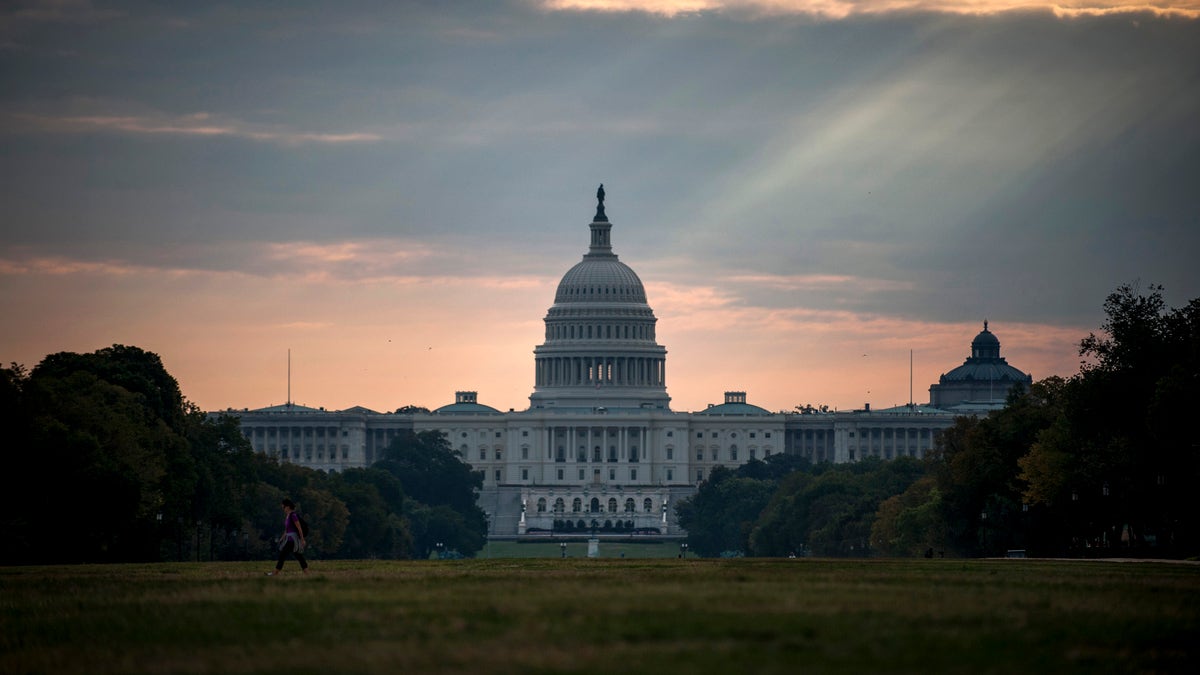
October 1, 2013: The U.S. Capitol building is seen after the federal government was shutdown when the House and Senate failed to pass a budget in Washington. (reuters)
A debt ceiling plan to reverse a recently passed cut to military pensions as the price for increasing the government's borrowing cap was proposed by House Republican leaders Monday -- and is receiving a rocky reception from conservatives.
GOP leaders briefed rank-and-file GOP lawmakers at a meeting in the Capitol in hopes of passing it on Wednesday before leaving Washington for a week-long break. It was unclear whether the vote would still go forward.
“This is an ugly, ugly, ugly vote,” one senior Republican member tied to leadership told Fox News. “Our conference is really splintered.”
The GOP bill would extend Treasury's borrowing authority for at least another year, repeal the curb passed in December on pension inflation adjustments for military retirees under the age of 62, and extend automatic cuts to Medicare and other programs to 2024, a year longer than presently scheduled.
It was not clear if the plan will fly with Democrats. Their votes would be needed to help pass the measure since some Republicans refuse to vote to raise the debt ceiling under any circumstances.
A spokesman for House Minority Leader Nancy Pelosi, D-Calif., said Democrats will continue to insist that any debt limit legislation omit add-ons, even bipartisan proposals like repealing military pension cuts.
But a 94-0 Senate procedural vote on Monday demonstrated the widespread support in both parties to repeal the pension cut, and GOP leaders seem confident they would win Democratic votes.
The Senate tally came in relation to a stand-alone bill to repeal the cut. A key consideration for Republican leaders is whether to schedule the vote — with the markets open — if they are uncertain of the outcome.
If Monday's plan falls through, GOP leaders may have little choice but to yield to Democratic demands for a debt ceiling measure that's "clean" of GOP add-ons, which would be a bitter defeat for a party that has sought to use must-pass debt ceiling measures as leverage to force spending cuts on Democrats.
The cuts to cost-of-living pension increases for military retirees under the age of 62 were part of December's budget agreement, backed by House Budget Committee Chairman Paul Ryan, R-Wis. Repealing them would cost $7 billion over the coming decade, the Congressional Budget Office said Monday.
The reduction has sparked uproar among advocates for veterans, and lawmakers in both parties want to repeal it. The cost of canceling the cut would be borne by extending for an additional year a 2 percentage point cut to Medicare reimbursements to doctors and hospitals, as well as cuts to a handful of other benefit programs. Those cuts, known as sequestration, would now extend through 2024, with savings for that year finally appearing to make up for almost a decade's worth of additional pension spending.
Time is running out for lawmakers to act to lift the debt limit. Treasury Secretary Jacob Lew told lawmakers last week that Treasury will exhaust by Feb. 27 its ability to employ accounting maneuvers to borrow to pay its bills.
Lew told congressional leaders on Monday that he had begun tapping two large government worker retirement funds to clear room under the debt limit. The action involving the Civil Service Retirement and Disability Fund will provide $50 billion to $75 billion in additional borrowing room while tapping the Government Securities Investment Fund will provide about $175 billion in borrowing room, Lew estimated.
Lew announced that he would suspend payments to these two pension funds and would also draw down investments made in the funds. Previous Treasury secretaries have also employed this bookkeeping maneuver. Once Congress approves a new debt ceiling, the Treasury makes the funds whole by replacing the withdrawn funds and lost interest earnings.
Lawmakers temporarily suspended the borrowing limit last October in an agreement that ended a government shutdown and extended the federal borrowing limit. With a fresh extension of borrowing authority now needed again, the GOP debt limit plan is likely to employ the same approach and suspend the debt limit through early next year.
Raising the limit is needed so the government, which ran a $680 billion deficit last year, can borrow enough to pay all its bills, including Social Security benefits, interest payments on the accumulated debt and government salaries.
After last year's 16-day shutdown and accompanying debt battle, Republicans controlling the House are no longer interested in a big fight with Obama over raising the borrowing cap, preferring to keep the election-year focus on Obama's unpopular health care law.
Obama gave in to GOP demands in 2011 to pair a $2.1 trillion increase in the debt limit with an equal amount in spending cuts, mostly to the Pentagon and domestic agency operating budgets. He has since refused to negotiate over the debt limit.
Republicans last year gave Obama two debt increases with only modest add-ons, like a provision to force the Senate to pass a federal budget.
Fox News' Chad Pergram and The Associated Press contributed to this report












































